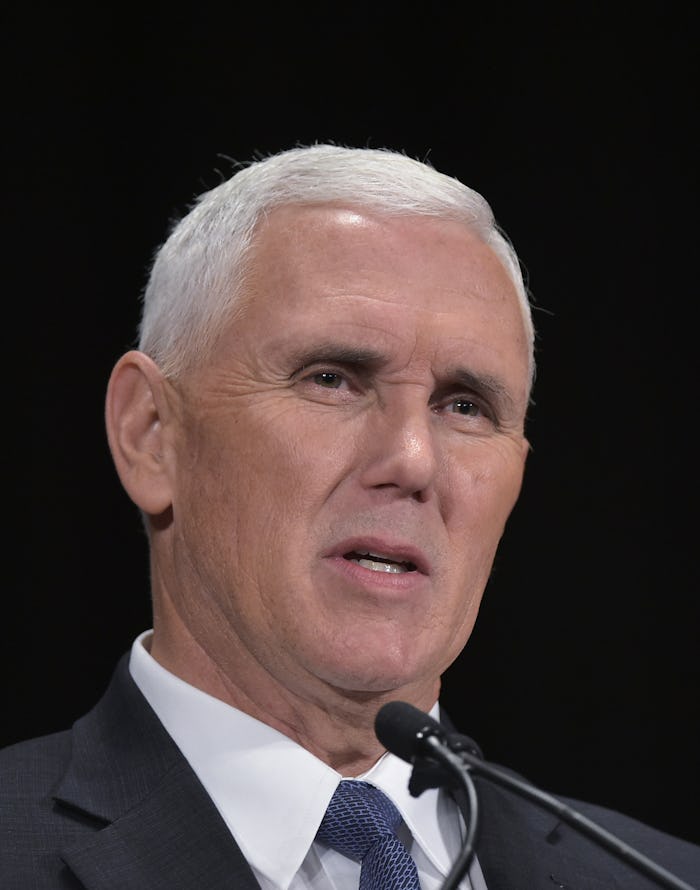News

Why It's So Important To Watch Mike Pence At The Vice Presidential Debate
During the average presidential election, the vice-presidential debates don't seem terribly important. But this hasn't been an average election season, which is why it's so important to watch Mike Pence at the vice presidential debate this week. In a battle of bigotry versus tolerance, common sense versus fear-mongering, and experience versus ineptitude, it's easy to see Indiana Gov. Mike Pence as a polished proxy for Republican presidential nominee Donald Trump.
The debate, which will be moderated by CBS reporter Elaine Quijano, is the only vice-presidential debate before the election in November. Pence's adversary will be Virginia Sen. Tim Kaine, a seasoned politician who Politico once described as the "responsible" choice for Clinton's running mate. The New York Times characterizes the face-off between Pence and Kaine as the "most high-profile and highly anticipated moment of their political careers so far."
Though Pence has been painted as a dull, tamped-down counterpart to Trump's color and pomposity, the two men have a lot in common, most notably their willingness to propose discriminatory legislation. As governor of Indiana, Pence infamously passed the Religious Freedom Restoration Act in 2015, which critics argued would legalize discrimination against the LGBTQ community. Following widespread protests against the bill, Pence later signed a revised version that explicitly prohibited business from denying "service to anyone on basis of sexual orientation, race, religion or disability,” according to The Washington Post.
Pence's stance on abortion rights and reproductive justice has been notably conservative, which some pundits see as an evangelical-friendly counterpart to Trump's less decisive views on abortion. In March, Pence signed a highly controversial law that prohibited women in Indiana from seeking abortions — including early-term abortions — based on the race, gender, or disability of the fetus. The law was subsequently blocked by an Indiana judge.
This 2016 abortion law was only the most recent in a deluge of anti-women legislation during Pence's tenure as governor. Since taking office in 2012, Pence repeatedly attempted to cut state funding to Planned Parenthood via several tactics, including legislation, policy changes, and budget cuts, according to Mother Jones. As a result, five rural Planned Parenthood clinics in the state closed. None of these five clinics had provided abortions, and their closures directly led to an HIV outbreak in Austin, Indiana, according to an investigation at The Chicago Tribune.
Given the attractiveness of Pence's anti-choice stance to Christian voters, it seems likely that this issue — along with questions about Pence's public comments against the LGBTQ community — will come up during Tuesday's debate. While these questions might offer Pence the opportunity to seduce social conservatives, he also runs the risk of sounding like a bigot, which might turn off centrists and independents. After all, this is the man who stated in 2006 that gay marriage is a harbinger of "societal collapse."
According to an account of Pence's debate preparations at The New York Times, the candidate is "methodical, disciplined and systematic. He and his team began preparing for the debate shortly before Labor Day, and each week have devoted an increasing amount of time to the effort." Given this, it seems likely that Pence is fully anticipating questions about abortion and LGBTQ rights, in addition to questions about other controversial issues connected to the 57-year-old governor's tenure, namely climate change and immigration.
On climate change, Pence recently said that "the reality is that this climate change agenda that Barack Obama and Hillary Clinton want to continue to expand is killing jobs in this country." Surely this is a topic that debate moderator Quijano will want to visit.
Even more pressing, though, will be immigration policy. Just this week, Pence lost a controversial battle in Indiana: Following the terrorist attacks in Paris last fall, Pence declared that Syrian refugees would be barred from settling in Indiana, a controversial stance opposed by many members of his own party. As reported in The Washington Post, this proposal suffered a "likely fatal blow" this week after three Republican-appointed federal appeals judges determined that Pence didn't have the authority to prevent funds from going to Syrian refugees, and they defined his actions as discriminatory.
As governor, this certainly isn't the first time that Pence has faced opposition from his own party. Indeed, many have conjectured that Pence accepted the position as Trump's running mate because he didn't believe he would be re-elected in Indiana.
Pence has a long track record as a politician, so there will be ample territory to cover during Tuesday's debate — and it certainly seems possible that his unpopularity as governor will be his undoing.